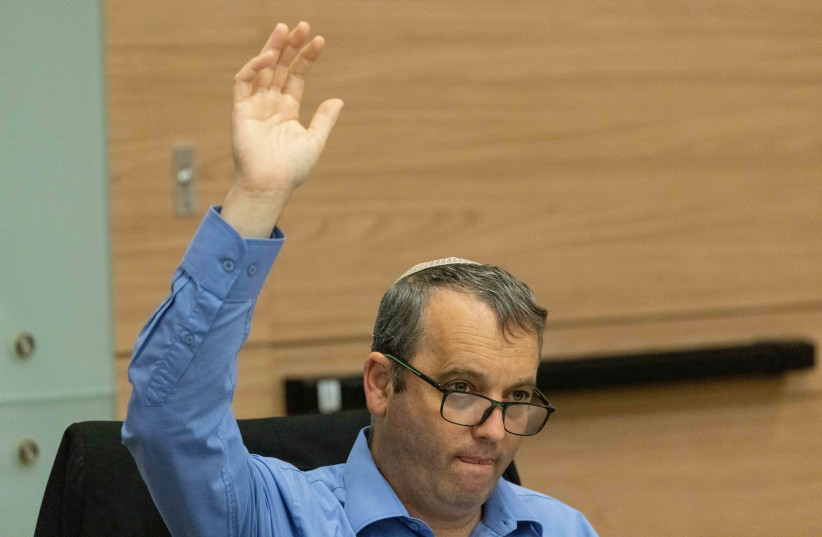The Knesset Law and Constitution Committee will examine the regulations that prevent individuals who meet recovery criteria set by Israel but do not have electronic certificates to prove it from entering the country, founder of NGO Yad L’Olim Dov Lipman, a former Knesset member, said.
Lipman expressed optimism that the meeting – set for Thursday – will mark the beginning of a process to amend this and other rules that are keeping people out of the country who have deep ties with it, including children, parents and siblings of Israeli citizens and residents.
“We feel very strongly about this issue, and I have been spending my time explaining the situation to Knesset members,” Lipman said. “The committee chairman MK Gilad Kariv set a hearing for tomorrow.”
Israel’s borders have remained closed to foreign nationals for over 20 months throughout the pandemic. In April, a special procedure was established to allow vaccinated or recovered first-degree relatives of Israeli citizens to receive permission to enter the country.
In September, however, the Health Ministry changed its criteria to consider an individual vaccinated or recovered. To meet them, people need to have been inoculated twice within the previous six months, vaccinated with a booster, recovered with one shot or recovered within six months.

Beginning November 1, the country reopened its skies to foreign visitors who fulfill these conditions – requiring, in the case of recovered tourists, to present an electronic recovery certificate. At the same time, it canceled the possibility of applying for special permissions as first-degree relatives.
Practically, this has left many who were able to visit Israel under the previous system, with no possibility to do so now, either because they do not meet the criteria – boosters are still not widely available – or because they cannot prove they do.
Israel is part of the European Union Digital COVID Certificate Consortium which includes over 40 countries that provide mutually recognized electronic documentation. For individuals who are not from these countries, Israeli authorities consider the recovery certificates too easy to forge, and therefore they are not recognized.
“People in the United States who recovered from COVID in the previous six months or earlier, and then receive only one shot, cannot enter. It does not make sense,” Lipman said.
During the hearing, he will to propose a solution: requiring recovered individuals without electronic documentation to undergo a serological test in Israel.
Before November 1, a serological test – which can prove the presence of antibodies in the blood – was required for individuals vaccinated or recovered abroad to be considered as such in the country.
In addition, starting from November 15, Israel will allow people inoculated with the Sputnik vaccine – which is not recognized by the World Health Organization and therefore currently not accepted as a legitimate vaccine by the Health Ministry – to visit, provided they undergo a serological test.
“If they are offering this option for Sputnik recipients, why not allow it also for recovered individuals whose documents are not accepted?” Lipman asked.
ESTABLISHED EARLIER this year, Yad L’Olim aims to help new immigrants navigate their new life in Israel, including the country’s notorious bureaucracy.
In the past few months, the NGO has been focusing on supporting immigrants and their family members abroad to ensure they could see each other in spite of the pandemic – support ranging from lobbying government officials to take their needs into consideration in designing the rules, to assisting individuals in petitioning offices and filling out forms.
During the committee’s meeting, Lipman is also going to raise the issue of people who do not meet the vaccination criteria, for example, because they were inoculated more than six months earlier and do not have any way to enter the country, even for a family life-cycle event.
“At the moment, the only situation that is accepted by the exception committee that gives special permission is the parent of a groom or a bride,” Lipman said. “But how can Israel prevent a grandparent from attending the birth of a grandchild, or a sibling the wedding of their brother? Require them to quarantine, to abide by all the necessary precautions, but do allow them to come.”
Asked about whether he believes that things could actually change – also considering that MKs have been usually hesitant to challenge decisions by the Health Ministry – he expressed confidence that it will happen.
“Most of the MKs I talk to are not aware of the details of the rules and how they are affecting people, but when I explained how a parent who raised their child to be Zionist and to make aliyah is prevented from visiting them as they are serving in the army as lone soldiers or as they give birth, they are shocked,” Lipman said.
“Kariv has demonstrated his willingness to look closely at the rules and to ask for changes when they seem wrong,” he added. “I hope that tomorrow will mark at least the beginning of the process to do so.”
